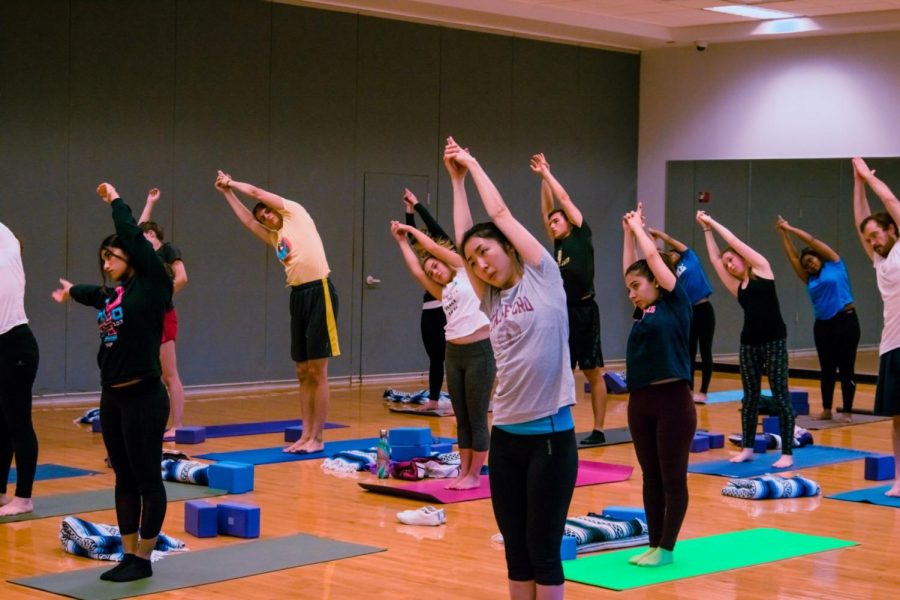Self-Care workshops at ARC, CRCE help students relieve stress
Students at the Campus Recreation Center East learn why self-care is important to their well-being and health through a two-hour yoga workshop Friday. Yoga is one of the five workshop themes in Campus Recreation Self-Care Workshop series.
November 13, 2017
Many initiatives on campus help combat students’ stress levels, ranging from wellness pledges to therapy dogs.
Alana Harris, assistant director of student wellness for Campus Recreation and doctorate student in kinesiology, organized Self-Care Week: a series of workshops at the ARC and CRCE from Nov. 6-10 that equipped students with various tools to take care of themselves.
Last semester, Harris planned a wellness week surrounding stress management as a trial run. After its success, she began planning this semester’s wellness week on self-care.
Harris decided on the theme based off her own observations about student wellness and the American College Health Association’s listed college health topics.
Harris reached out to various campus partners such as McKinley Health Center, the Counseling Center and the University of Illinois Extension Financial Wellness to facilitate these workshops.
Get The Daily Illini in your inbox!
“It’s nice to make students aware of the plethora of the services they offer and to bring them into space with less stigma, but still provides the service,” Harris said.
This semester’s Self-Care Week included workshops on skin care, wellness, relaxation, financial wellness and yoga.
Each of these workshops can fit into various sections of the University’s Wellness Wheel.
The Wellness Wheel embodies a more holistic view on wellness, as opposed to just diet and exercise. The wheel includes the following wellness topics: intellectual, environmental, spiritual, vocational, physical, social and emotional.
Harris said many students can get caught up in the physical aspect of wellness because it’s easier to quantify and the results are visible.
“I think that when you’re figuring yourself out that (fitness and nutrition) might be something that might be your entry point, but hopefully you see all these other wonderful things that feature overall wellness,” Harris said.
Wellness programs can be found on campuses all over the country, thanks to initiatives like Healthy Campus 2020 and to government-mandated corporate wellness programs led by the Office of Personnel Management.
Despite its increase in popularity, critics argue wellness and self-care are just another fad.
“I think those words might be a fad, but the concept is here to stay, or at least I hope it is,” said Madeline Rodriguez, co-facilitator of the wellness workshop and senior in LAS.
It can be challenging for students to incorporate the other aspects of wellness into their lives when it’s not clear what those aspects mean.
Margaret Whalen, graduate student in Education and co-facilitator of the skincare workshop, said the other pillars of the wheel are harder to follow because self-care is different for each individual, so the definitions are always changing .
“It’s hard to manage because there aren’t instructions on how to have optimal social, intellectual, emotional health,” Whalen said.
According to a 2010 Survey on the Utilization of Student Health Services by the American College Health Association, nearly 46 percent of college students utilized the psychiatry services at their respective universities. This is a relatively high number, especially when compared to the 55 percent of students who utilized nutrition services and the 90 percent who utilized health promotion services.
Harris emphasized the need for wellness weeks through Campus Recreation because nutrition and fitness can be safe entry points into other aspects of wellness.
Next semester, students can expect another wellness week. The theme will be resilience and Campus Recreation will continue to work with campus partners, so students’ understandings of wellness can continue to expand.
Harris also explained how much she really loved that this is a platform for those to reach out to people about certain things that may be uncomfortable to discus.
“Alcohol use, sexual assault, all those big trending things on college campuses — eating disorders,” Harris said. “There is just a number of people we get to reach by coming into a safe environment and getting the referrals and help and guidance they might need that is available to them.” s







